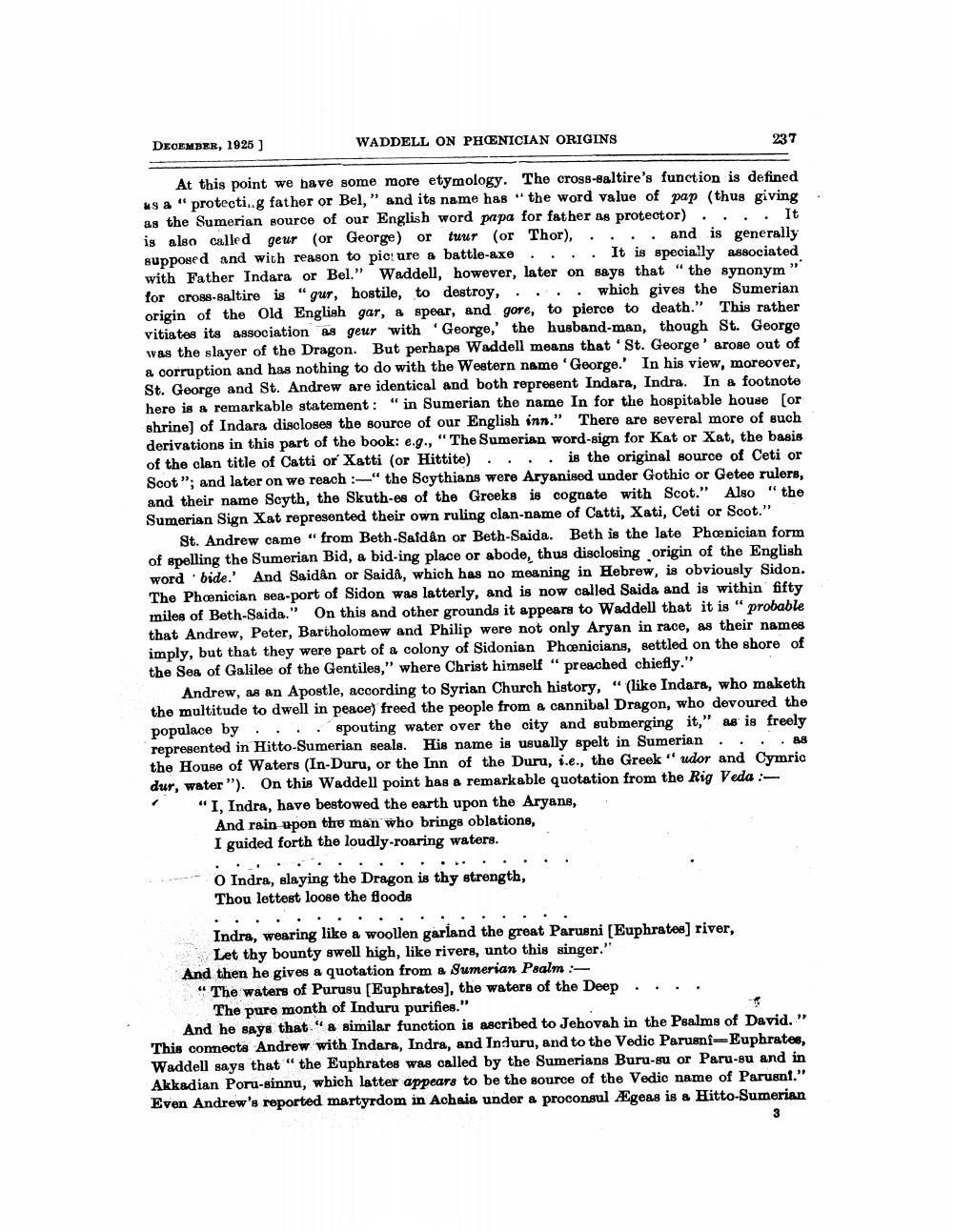________________
DECEMBER, 1925]
WADDELL ON PHOENICIAN ORIGINS
At this point we have some more etymology. The cross-saltire's function is defined the word value of pap (thus giving as a "protecti..g father or Bel," and its name has as the Sumerian source of our English word papa for father as protector).... It is also called geur (or George) or tuur (or Thor), . . . . and is generally It is specially associated supposed and with reason to pic: ure a battle-axe with Father Indara or Bel." Waddell, however, later on says that the synonym for cross-saltire is "gur, hostile, to destroy, which gives the Sumerian origin of the Old English gar, a spear, and gore, to pierce to death." This rather vitiates its association as geur with 'George,' the husband-man, though St. George was the slayer of the Dragon. But perhaps Waddell means that 'St. George' arose out of a corruption and has nothing to do with the Western name 'George.' In his view, moreover, St. George and St. Andrew are identical and both represent Indara, Indra. In a footnote here is a remarkable statement: "in Sumerian the name In for the hospitable house [or shrine] of Indara discloses the source of our English inn." There are several more of such derivations in this part of the book: e.g., "The Sumerian word-sign for Kat or Xat, the basis of the clan title of Catti or Xatti (or Hittite).... is the original source of Ceti or Scot"; and later on we reach :-" the Scythians were Aryanised under Gothic or Getee rulers, and their name Scyth, the Skuth-es of the Greeks is cognate with Scot." Also "the Sumerian Sign Xat represented their own ruling clan-name of Catti, Xati, Ceti or Scot."
237
St. Andrew came "from Beth-Saidân or Beth-Saida. Beth is the late Phoenician form of spelling the Sumerian Bid, a bid-ing place or abode, thus disclosing origin of the English word bide.' And Saidân or Saidâ, which has no meaning in Hebrew, is obviously Sidon. The Phoenician sea-port of Sidon was latterly, and is now called Saida and is within fifty miles of Beth-Saida." On this and other grounds it appears to Waddell that it is "probable that Andrew, Peter, Bartholomew and Philip were not only Aryan in race, as their names imply, but that they were part of a colony of Sidonian Phoenicians, settled on the shore of the Sea of Galilee of the Gentiles," where Christ himself "preached chiefly."
Andrew, as an Apostle, according to Syrian Church history, "(like Indara, who maketh the multitude to dwell in peace) freed the people from a cannibal Dragon, who devoured the populace by ... spouting water over the city and submerging it," as is freely represented in Hitto-Sumerian seals. His name is usually spelt in Sumerian. the House of Waters (In-Duru, or the Inn of the Duru, i.e., the Greek" udor and Cymric
88
dur, water"). On this Waddell point has a remarkable quotation from the Rig Veda :
·
"I, Indra, have bestowed the earth upon the Aryans,
And rain upon the man who brings oblations,
I guided forth the loudly-roaring waters.
O Indra, slaying the Dragon is thy strength, Thou lettest loose the floods
Indra, wearing like a woollen garland the great Parusni [Euphrates] river,
Let thy bounty swell high, like rivers, unto this singer."
And then he gives a quotation from a Sumerian Psalm :
"The waters of Purusu [Euphrates], the waters of the Deep
The pure month of Induru purifies."
And he says that "a similar function is ascribed to Jehovah in the Psalms of David. " This connects Andrew with Indara, Indra, and Induru, and to the Vedic Parusni-Euphrates, Waddell says that "the Euphrates was called by the Sumerians Buru-su or Paru-su and in Akkadian Poru-sinnu, which latter appears to be the source of the Vedic name of Parusni." Even Andrew's reported martyrdom in Achaia under a proconsul Ageas is a Hitto-Sumerian
3




